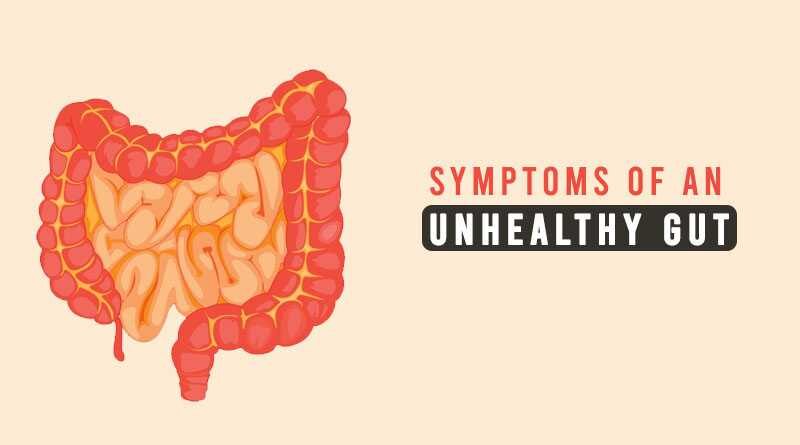8 Symptoms of an Unhealthy Gut That Everyone Should Know
Your gut interacts with almost all organs and systems of your body, playing a big role in digestion, brain function, and immune system. But if your gut is unhealthy, it can lead to lots of health issues and you find unhealthy gut symptoms.
There are trillions of bacteria along with yeast and viruses that live among this bacteria in your gut. When your gut bacteria, yeast, and viruses are imbalanced, this can provoke gut dysbiosis, which in turn negatively affects other body systems and organs.
Table of Contents
Causes of Gut Issues
An unhealthy diet is one of the most common causes of gut problems. Good bacteria feed on fiber and plant foods, while bad bacteria and yeast love processed products and sugar. Therefore, when you eat lots of processed foods and sugar, gut bad bacteria start to grow and can overtake good bacteria. However, while your diet is essential, it isn’t the only cause of gut issues. Other things include:
- Frequent use of antibiotics
- Alcohol consumption
- Chronic stress
- Medications
- Food intolerances
- Travel
- Bad sleep
Let’s look at the top signs of an unhealthy gut each of us needs to know:
Unhealthy Gut Symptoms
1. Diarrhea
Diarrhea is common and affects everyone at some point. However chronic or acute diarrhea(1) often indicates bacterial overgrowth or infection with a harmful type of bacteria.
Diarrhea can also worsen gut health by pushing out the good bacteria which will result in even more gut dysbiosis.
2. Constipation
Constipation usually has several underlying causes but according to one scientific review, constant constipation is often linked to gut imbalance. People who have chronic constipation typically have lower levels of good bacteria in their stool samples. Keep in mind that ignoring constant constipation may result in bleeding hemorrhoids, rectal prolapse, and fecal incontinence.
[Read: Foods for Constipation Relief ]
3. Gas and Bloating
Gas is usually a normal part of digestion but some types of gut bacteria naturally produce more gas than others. If you experience excess gas, it could lead to excessive fermentation, trapping gas in the gut and creating bloat. It is one of the common unhealthy gut symptoms.
[Read: Foods to Reduce Bloating ]
4. Poor concentration
Did you know that your gut produces neurotransmitters that are directly linked to thoughts, mood, and other cognitive abilities? According to various studies, gut dysbiosis can negatively impact learning and memory and contribute to inflammatory reactions in the brain.
5. Skin inflammation and acne
Gut issues may provoke skin conditions like eczema(2), psoriasis, and acne since your gut is directly connected with your skin through the gut-skin axis. Your gut plays a huge role in skin homeostasis and inflammatory reactions that keep your skin clear and healthy.
Read: Tea for Nausea
6. Chronic fatigue
According to several studies, people with chronic fatigue syndrome have abnormal levels of bad gut bacteria. In fact, 80 percent of patients with chronic fatigue could be diagnosed by checking their gut bacteria.
7. Autoimmune diseases
Your gut is responsible for your immune system and when it’s healthy, your immune system is also healthy. But when your microbiome is imbalanced this can lead to immune disorders like rheumatoid arthritis, type 1 diabetes, multiple sclerosis, and autoimmune liver disease.
Read: Symptoms for IBS
8. Weight gain and obesity
Bad gut bacteria overgrowth is one of the potential factors of weight gain and obesity. One research looked at the gut microbiome in overweight twins and found that the overweight twins had decreased levels of good bacteria. Certain types of bacteria can also lead to weight gain as the microbiome helps your body break down food and absorb nutrients.
Recommended Articles:
Leaky Gut: 10 Signs You May Have It




